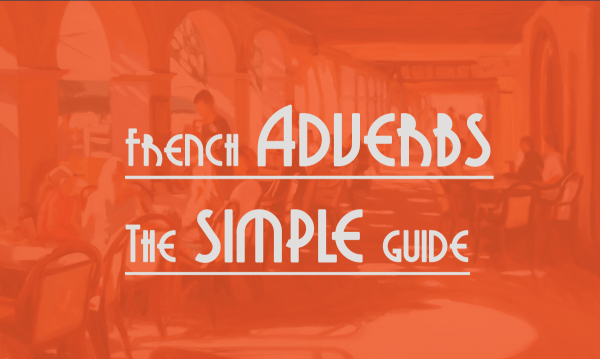Looking for a simple guide on French adverbs? Here in this article, we'll break down French adverbs into the simplest terms and make learning all about it a breeze for you.
Like other languages, the main words you'll learn in French are nouns, verbs, and adjectives. However, you will definitely need more than that to express your full idea. This is where adverbs enter the picture.
I'm sure you already know that French adverbs use the ending “-ment” like the “-ly” in Engish, but that’s not all there is to it.
This article will answer some questions you may have about French adverbs such as:
Let’s spend 5 minutes and all your questions will be answered.

What can a French adverb modify?
A French adverb, like its counterparts in other languages, can modify a verb, an adjective or another adverb. It can also relate to the whole sentence, telling you what the speaker is thinking or feeling. In other words, it can modify almost everything, except a noun (which is modified by an adjective)
Let's see some examples:

Speak, Listen, and Write French like a Native with Talk in French Complete Courses
How to form a regular French adverb from an adjective
Although there are many adverbs that do not have the ending –ment, this ending is undoubtedly an important category of adverbs. Let’s get through the general rules:
If the adjective ends with a vowel, add –ment to the adjective to form the adverb:
absolu ==> absolument
poli ==> poliment
If the adjective ends with a consonant, change it to the feminine form (to get the “e” at the end) and then add -ment:
normal ==> normale ==> normalement
éventuel ==> éventuelle ==> éventuellement
The different types of French adverbs
The table below lists down the main types of adverbs in French and commonly used examples:
| Type of adverb | Description | Example |
| Adverb of manner | Tell us how something happens. | bien, mauvais, poliment, énormément… |
| Adverb of quantity (intensity) | Explain how many or how much a thing is | assez, autant, aussi, beaucoup, moins, peu… |
| Adverb of time | Explain the time that something happens | actuellement, alors, hier, déjà, demain… |
| Adverb of place | Explain where something happens | Dehors, dedans, devant, derrière, en bas, en haut |
| Adverb of frequency | Explain how often something happens | toujours, souvent, parfois, rarement, jamais |
| Adverb of affirmation | Confirm or emphase something | certainement, vraiment, aussi |
| Adverb of doubt | Express a doubt | Probablement, apparemment, vraisemblablement |
The placement of French adverbs
When an adverb modifies a verb, it is placed after the verb
E.g: Il marche (verb) rapidement (adv)
Note:
If you are using a compound tense, the adverb will be placed after the auxiliary (the conjugated verb) but before the participle. E.G: Nous avons (verb) bien (adverb)dormi.
If an adverb modifies an adjective or an adverb, it will be placed before the word it modifies.
e.g.: Cette robe est peu (adv) chère (adj)/ Tu conduis trop (adv) vite (adv).
Note:
Here the adverb « trop » modifies the adverb « vite », so "trop" is placed before "vite".
Quick Recap
Adverbs and adjectives are sometimes confusing, so I hope this article could help you to understand it better and therefore you could speak and write French correctly.
Also check out:
120 Common French Adverbs to Add to Your Vocabulary
Improve your French faster with the French Grammar Mastery Course!

Speak, Listen, and Write French like a Native with Talk in French Complete Courses

[…] https://www.talkinfrench.com/french-adverbs/ […]
[…] Learn French Adverbs can be confusing. French adverbs have its own rules and functionalities, reading this article will deepen your understanding of it. […]